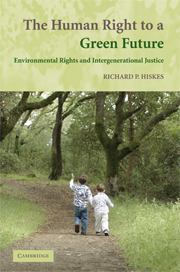Book contents
- Frontmatter
- Contents
- Acknowledgments
- Introduction
- 1 Environmental Human Rights and Intergenerational Justice
- 2 Emergent Human Rights, Identity, Harms, and Duties
- 3 Reflexive Reciprocity and Intergenerational Environmental Justice
- 4 Cosmopolitan Ethics, Communal Reciprocity, and Global Environmentalism
- 5 Toward a Global Consensus on Environmental Human Rights
- 6 Human Rights as Inheritance: Instituting Intergenerational Environmental Justice
- 7 Conclusion: Environmental Justice and the Emergent Future of Human Rights
- References
- Index
6 - Human Rights as Inheritance: Instituting Intergenerational Environmental Justice
Published online by Cambridge University Press: 01 July 2009
- Frontmatter
- Contents
- Acknowledgments
- Introduction
- 1 Environmental Human Rights and Intergenerational Justice
- 2 Emergent Human Rights, Identity, Harms, and Duties
- 3 Reflexive Reciprocity and Intergenerational Environmental Justice
- 4 Cosmopolitan Ethics, Communal Reciprocity, and Global Environmentalism
- 5 Toward a Global Consensus on Environmental Human Rights
- 6 Human Rights as Inheritance: Instituting Intergenerational Environmental Justice
- 7 Conclusion: Environmental Justice and the Emergent Future of Human Rights
- References
- Index
Summary
Thou shalt raise up the foundations of many generations, and thou shalt be called the repairer of the breach, the restorer of paths to dwell in.
Isaiah 58:12Toward the end of An Inconvenient Truth, former Vice-President and Nobel Prize winner Al Gore's movie and book (2006) exposing the prospects of global warming and climate change, Gore concludes that the solutions to environmental degradation lie within reach, but only if there exists enough political will to make difficult policy decisions. The sentiment is somewhat truistic, because the need for sufficient political will is necessary for any decision on many issues facing every nation and every generation. All collective choices wait on the coalescence of political will, so that the issue really depends on how we build sufficient political will to make the necessary environmental decisions that will indeed save the earth. In this book I have argued that employing the language and persuasive power of human rights presents a new, muscular approach to recognizing environmental ethical obligations to future generations. In other words, the power of human rights is uniquely suited to assisting us in gathering the collective will necessary to preserve the planet.
That collective will, I have argued, is distributed within nations and peoples but rarely shared among them. This presents both a particular difficulty of collective action regarding the environment as well as suggesting an alternative path on which to travel in building sufficient political will to confront a global problem.
- Type
- Chapter
- Information
- The Human Right to a Green FutureEnvironmental Rights and Intergenerational Justice, pp. 117 - 142Publisher: Cambridge University PressPrint publication year: 2008



